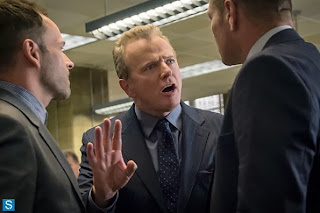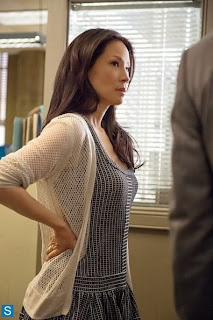 "On the Line" was written by Elementary co-executive producer and writer Jason Tracey (this is his fourth episode as writer), and directed by Guy Ferland, working here for the second time but a familiar name to those who pay attention to television credits, having directed numerous episodes of The Walking Dead, Sons of Anarchy, and many other shows across a range of genres. Presumably, his experienced eye is behind several effective moments of staging here, such as Holmes's (Johhny Lee Miller) surreptitious arming of himself when Lucas Bundsch (guest star Troy Garity) comes to call, or the shot angle when Gregson (Aidan Quinn) dresses down Holmes, which maximizes the space between them. These are simply small examples of effective moments in this strong episode.
"On the Line" was written by Elementary co-executive producer and writer Jason Tracey (this is his fourth episode as writer), and directed by Guy Ferland, working here for the second time but a familiar name to those who pay attention to television credits, having directed numerous episodes of The Walking Dead, Sons of Anarchy, and many other shows across a range of genres. Presumably, his experienced eye is behind several effective moments of staging here, such as Holmes's (Johhny Lee Miller) surreptitious arming of himself when Lucas Bundsch (guest star Troy Garity) comes to call, or the shot angle when Gregson (Aidan Quinn) dresses down Holmes, which maximizes the space between them. These are simply small examples of effective moments in this strong episode.For me, this is the best mystery of the week episode in a while--and it's not even really a mystery, as Holmes figures out in the first act that Lucas Bundsch is not merely a killer but a serial killer who abducts, imprisons, tortures, rapes and murders women. The bulk of the episode focuses on Holmes's attempts to nail Bundsch while Bundsch in turn plays cat and mouse games with Holmes and Watson (Lucy Liu), games in which one's ability ot disguise or conceal one's true nature are central--hich is an important thematic element of the peisode. The episode begins with a nice twist on a frequent mystery device, the staged scene. However, whereas staged scenes are usually murders made to look like suicide, in this instance a woman stages her suicide as a murder, in a desperate attempt to frame the man she blames for her sister's death years ago: Lucas Bundsch. For once Holmes's formidable deductive skills backfire, when, after exploding this ruse, he comes to believe that Bundsch is in fact a serial killer, now free to continue because the frame-up has been debunked--this time, seeing beneath the surface has led to injustice.
This is an interesting touch in the episode. Indeed, the episode devotes considerable attention to the negatives rather than the positives to which Holmes's behavior can lead. Sometimes, perhaps, solving the crime is not in fact going to lead to genuine justice, for instance, as in this case. Deception can be used for good, a point the episode plays out in relation to Holmes himself, as well as in the episode's initial crime--as well as for bad, in Bundsch's manipulations. BUndsch is a "catfish," someone who assumes false identities online as part of his predatory tactics. Whether he has holme son the line, though, or vice-versa, is the crux of their combat (the literal referent for the title is to Bundsch's use of phone calls to taunt Holmes, but surely the catfish reference invites us to think of the fishing metaphor as well).
Furthermore, Elementary rarely looks too closely at the ways having a consulting detective--and not merely a consulting detective but a very abrasive one--horning in and solving police cases might not go down well with the actual police. Human psychology and human territoriality mean that someone like holmes in the real world would almost certainly be resented by a grea tmany of the police, and we learn in this episode that in fact, this is the case in the show's world, as well.
This is crystallized in the figure of Detective Coventry (guest star Chris Bauer, who is a very familiar face to television fans), who failed to solve the initial case six years ago, and who lets his resentment of Holmes lead him to some highly dubious behavior, notably telling Bundsch where Holmes and Watson live, which leads to a well-played tense scene, when Bundsch comes by to visit and subtly threaten Holmes and Watson.
Coventry's resentment is a concrete example of how Holmes rubbing people the wrong way can have counterproductive consequences, as the investigation is compromised. Coventry also suggests that Department politics might turn on Gregson, if he keeps on giving Holmes latitude. Both this plot point and Holmes's object lesson in how putting some effort into keeping people onside might be of benefit in getting cooperation to solve crimes are key to the episode. Watson's schooling of Holmes about how his own vaunted brilliance ought to make it clear to him that buttering people up can be a more successful strategy than cutting them down is possibly the most important scene. Holmes's nature also gets him in trouble with Bundsch, as Bundsch is able--for a while, anyway--to yank Holmes's chain by manipulating him.
 Holmes of course ends up turning the tables, rather flatly and prosaically, by figuring out that Bundsch has hidden space in his studio where he keeps his victims concealed. After the cat and mouse ominousness of most of the episode, this resolution seems almost anti-climactic. More interesting, as always, is not the reolution of the murder so much as how we see the action of the episode carrying forward the Holmes/Watson relationship. This time, we get a complex resolution, with Holmes acknowledging that acting nice is sometimes worth the effort, and that he puts forth that effort for Watson because she is extraordinary, so deserves extroaordinary accommodation. However, for anyone hoping for a kinder, gentler Holmes to evolve, Holmes is adamant in telling Watson that he is not a nice man, will not become a nice man, and that he prioritizes Polonius's advice in Hamlet: "to thine own self be true." This philosophy, the episode hints, could be the source of ongoing friction between him and Watson. Indeed, Watson tells Holmes that nobody can put up with his bouts of unpleasantness forever. The complex self-awareness of Holmes here, acknowledging both that he can modify his behavior but also essentially putting forward a determinsitic thesis about his character, is Elementary at its best. It also lays the groundwork for some possible bumps in the road.
Holmes of course ends up turning the tables, rather flatly and prosaically, by figuring out that Bundsch has hidden space in his studio where he keeps his victims concealed. After the cat and mouse ominousness of most of the episode, this resolution seems almost anti-climactic. More interesting, as always, is not the reolution of the murder so much as how we see the action of the episode carrying forward the Holmes/Watson relationship. This time, we get a complex resolution, with Holmes acknowledging that acting nice is sometimes worth the effort, and that he puts forth that effort for Watson because she is extraordinary, so deserves extroaordinary accommodation. However, for anyone hoping for a kinder, gentler Holmes to evolve, Holmes is adamant in telling Watson that he is not a nice man, will not become a nice man, and that he prioritizes Polonius's advice in Hamlet: "to thine own self be true." This philosophy, the episode hints, could be the source of ongoing friction between him and Watson. Indeed, Watson tells Holmes that nobody can put up with his bouts of unpleasantness forever. The complex self-awareness of Holmes here, acknowledging both that he can modify his behavior but also essentially putting forward a determinsitic thesis about his character, is Elementary at its best. It also lays the groundwork for some possible bumps in the road.Do you agree, disagree? How did you like the episode? Think we'll see Coventry again? Or that we'll see Holmes playing a bit more nicely in future? Let me know your thoughts in the comments.





